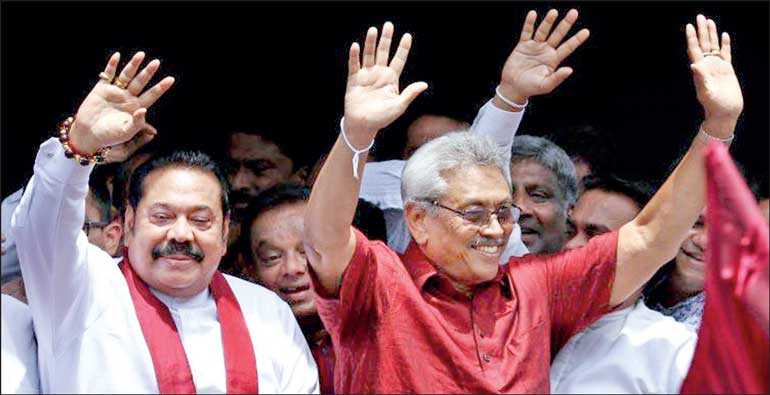Thursday Feb 19, 2026
Thursday Feb 19, 2026
Friday, 17 July 2020 00:00 - - {{hitsCtrl.values.hits}}

The confusion caused by the COVID-19 epidemic has not yet disappeared. In the circumstances, the Parliamentary Election is compelled to be held amidst a growing threat of a second wave. This situation will act as a factor that might dampen the election fervour and enthusiasm. Nevertheless, the election  will serve as a gauge that tests the strength of the ruling party and the Opposition.
will serve as a gauge that tests the strength of the ruling party and the Opposition.
The ruling party may win the election. But, if it fails to produce an impressive result, it will have an impact on weakening the strength of the Government. The Government was able to secure 6. 9 million votes in the Presidential Election. How many votes will it be able to secure in this election?
After the Presidential Election, it became evident that there were two centres of power within the ruling party. One power centre was built around President Gotabaya. The other was centred on the President’s brother, Prime Minister Mahinda Rajapaksa. Both centres had supporters, and Gotabaya was regarded by his supporters as a genuine and progressive leader. On the contrary, they perceive Prime Minister Mahinda Rajapaksa as an unclean, reactionary leader. If there was no conflict between the two, there seemed to be a contradiction in their opinion and attitude.
There can be a change in the balance of power between the two brothers after the election. Until now, it was the President who had functioned as the Head of State. As expected, the ‘Viyathmaga’ does not possess adequate capacity of gaining power over the supporters of Prime Minister Mahinda Rajapaksa.
According to the 19th Amendment, it is the Prime Minister, not the President, who becomes the central figure in State power. The President must act in accordance with the instructions of the Cabinet, headed by the Prime Minister. The Cabinet is decided by the Prime Minister, not the President. This situation might sometimes lead to create a state of confusion.
The Opposition
The main Opposition, the United National Party (UNP), is in a state of rift, divided into two factions. Had it been able to maintain its unity following the massive defeat in the Presidential Election, it would have been possible for them to face the Parliamentary Elections as a strong political force. But the old Leader as well as the new Leader of the party failed to preserve the unity of the party. Inevitably, the two leaders as well as the party will have to pay a heavy price for it.
This election is also crucial for the JVP. If it fails to produce an impressive result, it may suffer the same tragic fate befell on the traditional left parties. Compared to other political parties, it has been able to refrain itself from being pushed into a state of extreme corruption, but it has failed to fulfil a progressive and creative role in parliamentary politics. At the very least, it has not been able to play a fruitful role against the corrupt level which the Parliament has fallen into. 
Regardless of the number of seats won in the election, the minority parties of Muslims, Tamils and Kandyan Tamils will face the dilemma of selecting the path they should choose.
Playing with the Constitution
Whatever may be the outcome of the election, the ambition of the ruling party would be to build a two-thirds majority in Parliament by encouraging a group of Opposition MPs to join the Government.
But this aspiration is unconstitutional.
The inability to change parties without losing the parliamentary seat can be considered a unique feature introduced by the presidential system of governance created by the second Republican Constitution. Maintaining the consistency of the balance of political power created by one election till the next election without leaving room for defections in between can be considered an inherent feature of the philosophy of that Constitution.
When an impeachment motion was brought against President Ranasinghe Premadasa, eight UNP Members of Parliament involved in it were expelled from the party. The eight MPs who were expelled from the UNP went to Court to defend their seats. But, the tripartite panel of Judges headed by Mark Fernando, which heard the case, deprived the eight UNP members of their parliamentary seats.
From the beginning of the second term of the regime of President Chandrika, a system was in operation, with the support of the Judiciary, enabling the MPs of the Opposition to join the ruling party without losing their seats. At one point of this unconstitutional process, a five-Judge bench headed by Chief Justice Sarath Silva delivered a strange judgment in respect of a Member of Parliament (Ameer Ali) who had joined the ruling party from the Nuwa party which was affiliated to the Muslim Congress. The Court ruling stated that the public interest must also be taken into account in respect of the cases involving the change of the party.
It can be considered a grave violation of the Constitution committed by the Judiciary itself, which is responsible for the protection of the Constitution, to establish a system to protect the seats of the Members of Parliament who cross over from the Opposition to the ruling party, having received a large bribe. It caused a great distortion in the system of governance.
An unfortunate consequence of the above judgment has been that it paved the way for creation of a system in which the MPs were getting sold out for large sums of money. There were instances where some MPs had got sold out for hundreds of millions of rupees in the overthrow of some governments.
Government expectations
President Sirisena said publicly that he could not gain majority power in the Parliament when he appointed Mahinda Rajapaksa, ousting Prime Minister Ranil Wickremesinghe, in 2018 as it was not possible to pay high prices demanded by the Members of Parliament who wished to join the ruling party. It shows the level of degeneration and rottenness of not only the system of governance of Sri Lanka but also the heads of State.
The President has stated on several occasions that there are Opposition MPs who have already expressed their willingness to join the Government after the election, enabling the latter to form a government with a two-thirds majority. Doesn’t the President know that such a system is unconstitutional?
Violation of the Constitution by narrow-minded political leaders who come to power from time to time is an important factor in destabilising and degrading the country’s system of governance. It is not surprising that the country would become miserable if the heads of State and the Judiciary, which are responsible for the protection of the Constitution, tend to violate the Constitution, the supreme law of the country.
The dream of two-thirds majority is not easy to come realise; even if it comes true, the prevailing socio-economic and political environment in the country is such that there is no space for successful rule even with a two-thirds majority.
The end
The economic balance sheet of the country is in a precarious position, difficult to hold on to and prevent from collapsing. According to the World Bank’s forecasts, Sri Lanka’s economic growth is expected to fall
to minus 3.
Foreign exchange earnings seem to be declining at an extraordinary rate; meeting the day-to-day Government expenditure and repayment of instalments and interest on loans obtained on a commercial basis have become extremely difficult. This situation could lead to a state of complete bankruptcy of the country at any moment.
This special historical situation that has arisen in the country can be summarised as follows. The political system in Sri Lanka was inherited from the British and it was not formalised at the time of independence to suit the needs of the newly-gained independence. No attempt was made after independence to build the nation, leading to national integration which is a sine qua non of the existence of the nation-state.
The oppression of people on the basis of caste, creed and religion by the ruling parties that came to power after independence, riots and rebellions, the policies followed disregarding the constitution led to the disruption of the entire political system.
Since 1978, looting of public property has become a regular feature of State administration, leading to the maximum level of corruption in the State and the entire institutional system of the Government. It can be said that the continued neglect of necessary reforms to rectify the deterioration of the political system has led to paralyse the entire system.
It is as a result of this historic process that not only the recognition of old political parties and the leaders, but also that of the old systems of institutions, is being lost.
The only way to change this situation would be to move the country towards making a ‘People’s Constitution’ that will lead to recreating the entire system through structural reforms.